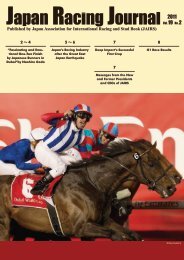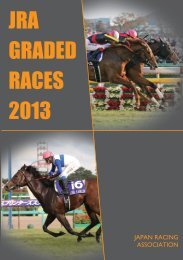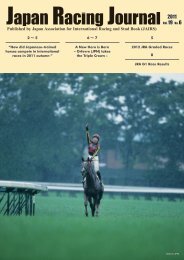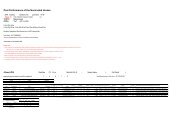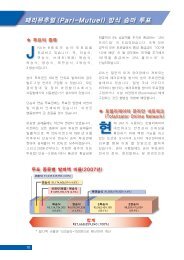2012 JRA Graded Races Guidebook (PDF / 20MB) - Horse Racing ...
2012 JRA Graded Races Guidebook (PDF / 20MB) - Horse Racing ...
2012 JRA Graded Races Guidebook (PDF / 20MB) - Horse Racing ...
Create successful ePaper yourself
Turn your PDF publications into a flip-book with our unique Google optimized e-Paper software.
of <strong>Racing</strong> Chemistry, on sample A. Should the existence of a prohibited drug<br />
or medication be detected, sample B will then be tested automatically at the<br />
same Laboratory, in the presence of the non-partisan designated witnesses,<br />
who have knowledge of the field of Physico-chemical testing. No notice will<br />
be given to the connections of the horse at this time. No person other than<br />
these witnesses can be present at the retest procedure. If the presence of<br />
the same prohibited drugs or medication is detected in both samples A and B,<br />
it will be considered as a violation of the drug and medical regulations. The<br />
horse concerned will be disqualified and suspended from running in a race<br />
for a fixed period. The connections of the horse will not be entitled to receive<br />
any prizes, or prize money. The horse connections concerned may be<br />
charged under Article 31 of the <strong>Horse</strong> <strong>Racing</strong> Law and will be penalized in<br />
accordance to Paragraphs 123, 131, 138, and 140 of the <strong>JRA</strong> Rules of<br />
<strong>Racing</strong>.<br />
VACCINATION<br />
Vaccination requisite is based on the animal health requirement agreed<br />
upon between the government authorities of each country and the Japanese<br />
Government. Please ask your country’s government for details. Aside from<br />
the requirement established by government, the <strong>JRA</strong> recommends Japanese<br />
Encephalitis virus vaccination as described below.<br />
1. Japanese Encephalitis Virus Vaccination<br />
The <strong>JRA</strong> strongly recommends that the foreign trained horses which<br />
participate in the races held in our jurisdiction during July to October to be<br />
vaccinated against Japanese Encephalitis (JE) virus with an acceptable<br />
inactivated vaccine before coming to Japan. The <strong>JRA</strong> does not take any<br />
responsibility for any horses coming to Japan during this period without being<br />
inoculated with the necessary vaccine protection from JE. Although it is also<br />
possible for the <strong>JRA</strong> to provide the vaccine required for inoculation prior to<br />
the horse coming to Japan, owners should ask the respective authorities in<br />
their own country about import procedures and permission for use of the<br />
vaccine overseas. The reason the <strong>JRA</strong> strongly recommends vaccination of<br />
JE is as follows:<br />
During the period of July to October of each year, JE is prevalent in the<br />
natural environment in Japan. This is primarily an interaction between<br />
infected mosquitoes (Culex Tritaeniorhynchus) and swine. JE virus infection<br />
has been designated as an infectious disease under the Domestic Animal<br />
Infectious Diseases Control Law in Japan. Any horse becoming infected will<br />
require isolation. It is therefore conceivable that even uninfected horses<br />
might be precluded from subsequent domestic transportation and this would<br />
have a major effect on our race meetings in Japan. Consequently, to<br />
preclude the spread of the infection to horses, all race horses in Japan are<br />
required to be vaccinated with two doses of 1ml each, given from a two week


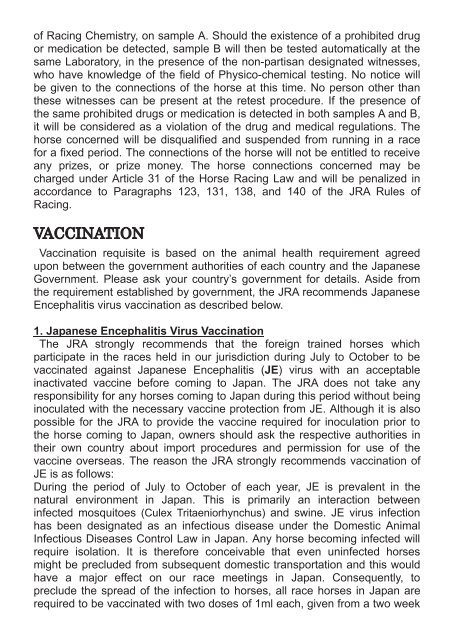



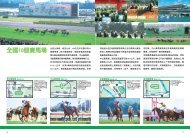

![일본 경마의 간략한 역사 [PDF:478KB] - Horse Racing in Japan](https://img.yumpu.com/19276417/1/184x260/-pdf478kb-horse-racing-in-japan.jpg?quality=85)

